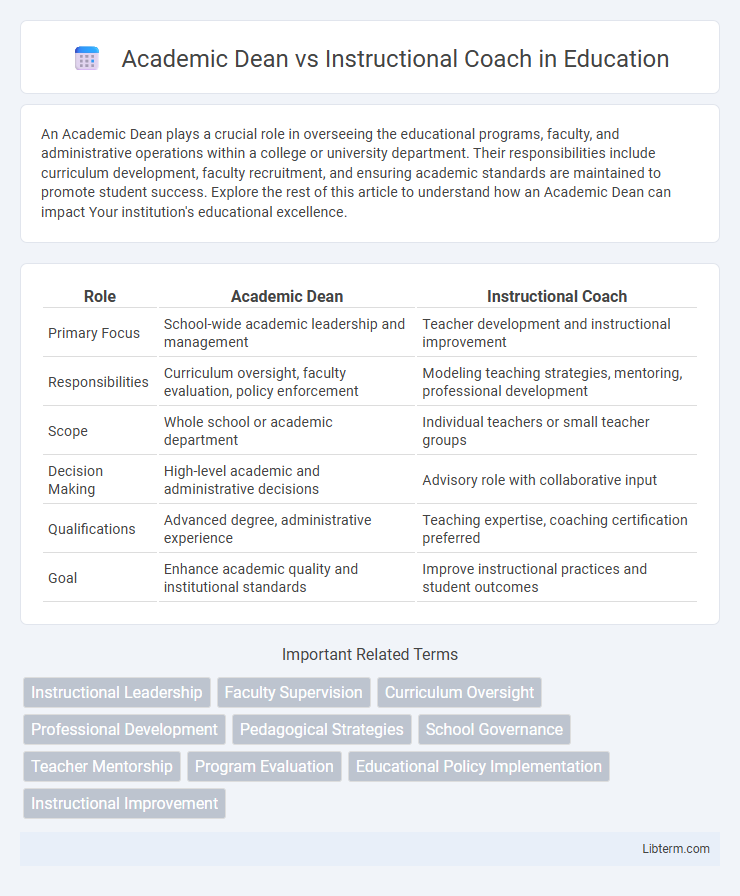An Academic Dean plays a crucial role in overseeing the educational programs, faculty, and administrative operations within a college or university department. Their responsibilities include curriculum development, faculty recruitment, and ensuring academic standards are maintained to promote student success. Explore the rest of this article to understand how an Academic Dean can impact Your institution's educational excellence.
Table of Comparison
| Role | Academic Dean | Instructional Coach |
|---|---|---|
| Primary Focus | School-wide academic leadership and management | Teacher development and instructional improvement |
| Responsibilities | Curriculum oversight, faculty evaluation, policy enforcement | Modeling teaching strategies, mentoring, professional development |
| Scope | Whole school or academic department | Individual teachers or small teacher groups |
| Decision Making | High-level academic and administrative decisions | Advisory role with collaborative input |
| Qualifications | Advanced degree, administrative experience | Teaching expertise, coaching certification preferred |
| Goal | Enhance academic quality and institutional standards | Improve instructional practices and student outcomes |
Overview: Academic Dean and Instructional Coach Defined
The Academic Dean is an educational leader responsible for overseeing academic programs, faculty management, and curriculum development within a school or college, ensuring adherence to institutional policies and academic standards. In contrast, an Instructional Coach specializes in improving teaching practices by providing personalized support, training, and feedback to educators to enhance student learning outcomes. Both roles are integral to educational success, with the Academic Dean focusing on administrative leadership and the Instructional Coach on instructional improvement.
Core Responsibilities: A Comparative Breakdown
An Academic Dean primarily oversees curriculum development, faculty management, and compliance with educational standards, ensuring institutional goals align with academic policies. Instructional Coaches focus on enhancing teacher effectiveness through personalized training, classroom observation, and implementation of evidence-based instructional strategies. While Academic Deans manage broad academic leadership and administrative duties, Instructional Coaches provide targeted support to improve instructional practices and student outcomes.
Role in School Leadership Structure
The Academic Dean primarily oversees curriculum development, faculty performance, and academic policies to ensure educational standards align with school goals, functioning as a central figure in school leadership. The Instructional Coach focuses on supporting teachers through professional development, personalized coaching, and instructional strategies to enhance classroom effectiveness and student learning outcomes. Both roles contribute to school leadership by fostering academic excellence, but the Academic Dean operates at a strategic level while the Instructional Coach works directly with educators to implement best practices.
Qualifications and Required Experience
An Academic Dean typically requires a master's or doctoral degree in education or a related field, along with several years of administrative experience in academic settings, demonstrating leadership in curriculum development and faculty management. Instructional Coaches generally hold a teaching certification and a master's degree in education or instructional design, with significant classroom teaching experience and expertise in pedagogical strategies to support teacher development. Both roles demand strong communication skills, but the Academic Dean emphasizes strategic academic leadership, while the Instructional Coach focuses on hands-on instructional improvement.
Focus Areas: Curriculum vs. Instructional Support
Academic Deans primarily concentrate on curriculum development, ensuring alignment with educational standards and institutional goals, while Instructional Coaches focus on providing instructional support through teacher training, feedback, and classroom strategy implementation. The Academic Dean's role involves overseeing course design, program accreditation, and assessment policies, whereas Instructional Coaches work directly with teachers to enhance instructional practices and student engagement. Both roles are essential for improving educational outcomes but address different aspects of the teaching and learning process.
Impact on Teacher Development
Academic Deans play a strategic role in teacher development by overseeing curriculum implementation, setting professional standards, and facilitating school-wide professional learning communities to enhance instructional quality. Instructional Coaches provide targeted, hands-on support, offering personalized feedback, modeling effective teaching practices, and fostering ongoing reflective growth in individual teachers. Both roles significantly contribute to elevating instructional effectiveness, with Academic Deans shaping systemic approaches and Instructional Coaches driving classroom-level improvements.
Involvement in Student Achievement Initiatives
Academic Deans play a pivotal role in student achievement initiatives by overseeing curriculum development, faculty performance, and institutional policies to ensure academic standards and student success. Instructional Coaches directly collaborate with teachers to implement evidence-based teaching strategies, improve instructional quality, and support personalized student learning. Both positions drive student achievement, with Academic Deans focusing on strategic leadership and Instructional Coaches emphasizing classroom-level instructional improvement.
Decision-Making Authority and Scope
An Academic Dean holds significant decision-making authority over curriculum development, faculty appointments, and budgeting within a school or college, shaping institutional policies and academic standards. In contrast, an Instructional Coach primarily supports teachers through individualized professional development and instructional strategies without direct control over administrative or financial decisions. The scope of an Academic Dean spans broad institutional priorities, whereas an Instructional Coach focuses on enhancing classroom practices and student learning outcomes.
Collaboration with Administrators and Educators
Academic Deans collaborate closely with school administrators and educators by overseeing curriculum standards and ensuring compliance with academic policies, fostering a cohesive educational environment. Instructional Coaches work directly alongside teachers to enhance instructional techniques, providing personalized support and professional development to improve classroom outcomes. Both roles require strong communication and teamwork skills to align school objectives with effective teaching practices and student achievement.
Career Pathways: Advancement and Opportunities
Academic Deans typically advance through administrative leadership roles, often requiring advanced degrees and extensive experience in educational management, emphasizing strategic planning and curriculum oversight. Instructional Coaches progress by honing expertise in teaching methodologies and professional development, frequently leading to roles in teacher training, curriculum design, or education consultancy. Career pathways for Academic Deans offer broader institutional impact and higher executive potential, while Instructional Coaches specialize in instructional quality and educator effectiveness within classroom settings.
Academic Dean Infographic

 libterm.com
libterm.com